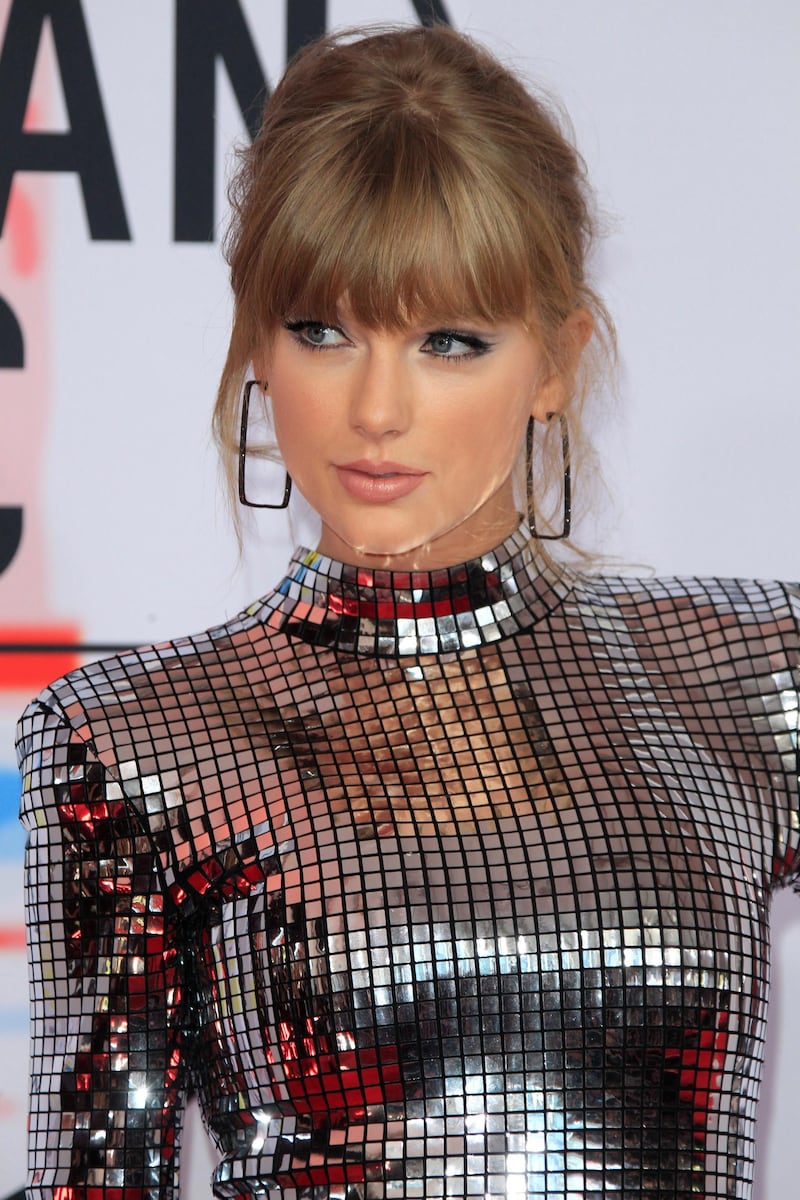Taylor Swift can count her lucky stars she’s not Natalie Maines. Swift, who pocketed the American Music Awards' Artist of the Year gong last week, got the Donald Trump treatment when she endorsed two Democratic candidates in her home state of Tennessee, ahead of November’s midterm elections.
"Let's say that I like Taylor's music about 25 per cent less now, OK?," Trump told a press pack soon after. Supporters of the president were quick to turn up the heat on the singer, with one contributor to Fox & Friends – Trump's favourite morning show – telling Swift: "I wish you would've not done this. Stay away from politics."
Contrast that with the outright professional ruin that faced Maines, lead singer of country trio the Dixie Chicks, after she introduced their song Travelin' Soldier to a London audience in 2003 with a verbal attack on then United States president George W Bush.
Her comment, heard around the world – 10 days before the US invasion of Iraq – was, "Just so you know, we're on the good side with y'all. We do not want this war, this violence, and we're ashamed that the president of the United States is from Texas."
Patriotic Americans were outraged, and the band’s charting single at the time – a cover of Fleetwood Mac’s Landslide – fell from number 10 to 43 on the Billboard Hot 100 in a week. Tour sponsors faced a storm of complaints and in Bossier City, Louisiana, hundreds of protesters brought their Dixie Chicks CDs to be crushed by a 16-tonne bulldozer.
The band went on hiatus and faced a near-total broadcast blacklist until Bush left office in 2009. Although Maines continues to perform and has criticised the current president as well as Texas senator Ted Cruz, it was a cautionary tale for entertainers diving into the shark tank of US politics.
That Swift, a formerly innocuous crowd-pleaser, joined America’s kulturkampf reveals how the country’s polarisation has pushed musicians and actors into the front lines.
Kanye West was among the first out of the trenches, saying Trump's 2016 victory had inspired him to run for the White House in 2024. An audience member at the liberal stronghold of Saturday Night Live said the studio "fell dead silent" recently when West – wearing a Make America Great Again cap – launched into a political speech.
West followed this up with last week’s rambling tirade in front of president Trump in the Oval Office. “All we really have is today. We just have today,” West said. “Over and over and over again, the eternal returns, the hero's journey and Trump is on his hero's journey, right now.”
On the other side of the divide, actress and comedian Amy Schumer and model Emily Ratajkowski were among more than 300 people arrested last week at a Senate building sit-in over Brett Kavanaugh, the US Supreme Court Associate Justice accused of sexual assault.
Others have gone beyond protests and soundbites, running for office themselves. Actress Cynthia Nixon of Sex and the City fame recently sought – and lost – the Democratic nomination to run for governor of New York. In a heated debate in August, with her opponent, incumbent governor Andrew Cuomo, Nixon was accused of using her relationship with Mayor Bill de Blasio to help out friends in the entertainment world, including Sex and the City co-star Sarah Jessica Parker.
Celebrity politics have also spilled out from their traditional barrack rooms of music and Hollywood. Back in Texas, Cruz’s Democratic opponent in next month’s election, Beto O’Rourke, received the endorsement of world-famous online yoga guru Adriene Mishler who enjoys the loyal support of more than four million YouTube subscribers.
This is how @BetoORourke is spending Father’s Day. He has my vote. I wish I was there. https://t.co/kPFkpmNFVS
— Adriene Mishler (@yogawithadriene) June 17, 2018
Politics and entertainment in the US have always mixed. Not only was Ronald Regan a former actor, but he was a one-time trade union boss, leading the Screen Actors Guild in a showdown with studio moguls. Old warhorses Bruce Springsteen and Ted Nugent have lent their support to left and right-wing campaigns, respectively, for years.
Even some foreign artists can’t resist the lure of US electioneering, if only to distance themselves from one candidate or another. Elton John publicly said he did not want the 2016 Trump campaign to use his music, declaring: “I’m not a Republican in a million years.” Fellow Brit conscientious objectors have included Queen, Adele and the estate of George Harrison.
Electoral showdowns tend to galvanise supporters – be they foot soldiers or the celebrity corps. That Swift chose this moment to pin her colours to the mast perhaps reflects the undoubted division afflicting US society and politics in the Trump era. The US is a place where sitting on the fence is no longer an option.
In April 2003, Bush was asked by The New York Times about the Dixie Chicks' criticism. "I … don't really care what the Dixie Chicks said," he replied. "I want to do what I think is right for the American people, and if some singers or Hollywood stars feel like speaking out, that's fine."
Simpler times.
____________
Read more
Taylor Swift breaks political silence, backs Tennessee Democrats
Israeli court fines two New Zealanders over Lorde gig opinion piece
Memory almost full: here's how to get your musical mojo back
____________






